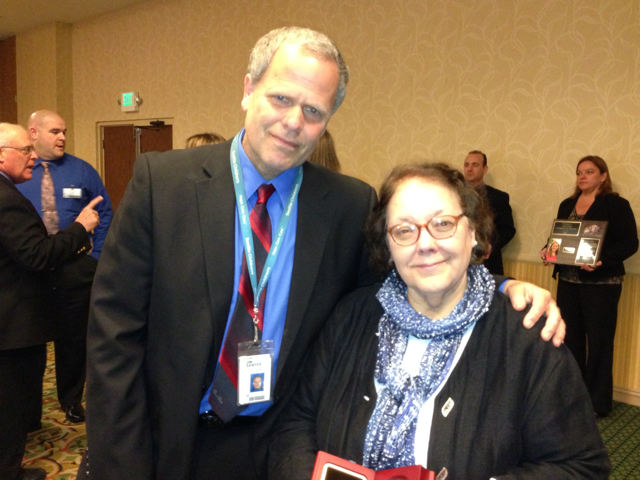AARP Hearing Center

Consumers lose billions of dollars every year to various kinds of consumer fraud, and according to AARP studies, older adults are especially vulnerable. A 2011 survey of fraud victims found that 81% of investment fraud victims and 84% of lottery fraud victims were over the age of 55.
To help combat scams and schemes aimed at older adults and their families, the AARP Foundation launched the “Fraud Fighter Call Center” in 2006. Since then, trained volunteer Fraud Fighters have contacted more than 500,000 people nationwide offering the tips, resources and information they need to protect themselves from fraud and abuse.
In recognition of those efforts, the Washington State Crime Prevention Association ( WSCPA) presented the Call Center with its “2013 President’s Award.” The yearly honor is given by the WSCPA to organizations and individuals who work tirelessly to lower criminal victimization of our elderly, especially in the field of financial fraud.
“Jean Mathisen and the AARP Fraud Fighters do a fabulous job reaching out to Washington seniors and protecting them from scams and frauds of all kinds,” said WSCPA Executive Director Daryl Pearson. “Their work is an important part of our efforts to combat the fraudsters and criminals looking to take advantage of our friends and families.”
To keep a step ahead of emerging scams, the Call Center collaborates with a number of key leaders and community partners including the Attorney General’s Office, the Federal Trade Commission, the Washington State Department of Financial Institutions, the Financial Industry Regulatory Authority (FINRA) Investor Education Foundation, the Washington State Office of the Insurance Commissioner, and the WSCPA.
Earlier this year, the Call Center teamed up with the U.S. Postal Inspection Service to combat foreign lottery fraud. One of just dozens of foreign lottery frauds, the Jamaican Lottery Scam alone could be bilking older Americans out of more than $1 billion a year. The fraud prevention effort included more than 25 million pieces of direct mail warning of the scam, television public service announcements, and information at more than 33,000 post offices nationwide.
AARP Fraud Fighters are also offering to assist consumers if they suspect that someone they know is in danger. “It can be difficult for family members or friends to raise the issue of suspected fraud,” said AARP Call Center Director Jean Mathisen. “Finances are such a personal topic, and many people are unsure of how they can help or whether or not they should intervene. A call from a peer, or from someone who isn’t as close to the victim, can sometimes make a significant difference,” she said. A 2003 report by AARP and the Department of Justice showed that consumer education and peer-to-peer counseling can lower a victim’s willingness to respond to fraudulent pitches by more than 50 percent.
Consumers can find more information about the AARP Fraud Fighter Call Center or order consumer protection materials free of charge by calling 1-800-646-2283, or by visiting AARP’s website.
You can find out more about the AARP Fraud Fighter Call Center by viewing the short video below:































































